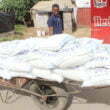The Jesuit Centre for Theological Reflection (JCTR) says the bumper harvest, estimated at over 3.6 metric tonnes, which Zambia has recorded should lead to a reduction in mealie meal price.
In a statement issued by JCTR public relations officer Tendai Posiana yesterday, the theological centre noted that there was need to improve the marketing of maize and other agricultural crops if the bumper harvest was to have positive impact on people’s lives.
“It is vital to note that the production of maize, millet, rice, groundnuts and beans has increased and the JCTR desires to see an increased production in other crops like sugarcane, wheat, potatoes and many other crops that are suitable to grow in our country. With this bumper harvest it is therefore expectant that the country will have a reduction and stable mealie meal price which have remained above K90 for a while. The JCTR also urges that FRA should buy maize from small scale farmers especially those who are in typical rural areas who fail to find easy access to the market,” Posiana stated.
She also stated that JCTR was hopeful that the lifting of the maize export ban would lead to a stable kwacha exchange rate.
“The immediate benefit of lifting the export ban is increased agriculture percentage contribution to GDP which has been a key objective for government. This might also promote foreign exchange inflow thereby stabilizing Kwacha exchange rate which has been performing poorly and has ranged between K9 and K10 per US dollar for some time now,” stated Posiana.
“Zambia’s neighbouring countries are in maize deficit, this should be explored and Zambia should benefit from this by increasing its maize exports. JCTR hopes that increased agricultural production will spur value addition and ultimately economic transformation. Value addition remains a big challenge in our country as most farmers sell their crops without adding any value to them which makes our products less competitive and low priced.”












